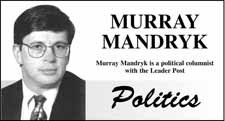The recent news of long-time New Democrat Pat Atkinson's pending departure from politics reminds us of an important turning point for the NDP.
Atkinson was one of those New Democrats first elected in 1986 during the NDP's comeback from the brink of oblivion after the Grant Devine Progressive Conservative massacre in 1982. And she was re-elected in the great NDP comeback when it stormed back to power in 1991 by winning a remarkable 55 seats including an amazing 30 out of 40 rural seats.
But most of Atkinson's political career has paralleled the utter demise of NDP rural vote that culminated with the virtually disappearance of NDP vote in rural Saskatchewan in 2007.
This is not to suggest that she is to blame for it. Rather, Atkinson is more of a symbol of how the NDP and rural Saskatchewan have parted ways.
The daughter of renown National Farmers' Union advocate Roy Atkinson, Pat Atkinson is one of the few current NDP MLAs who was even raised on a farm. And what always seems to be lost on modern-day New Democrats is how far removed today's rural Saskatchewan philosophy is compared with the philosophy under which Atkinson was raised.
The demise of the NDP's rural actually started long before Atkinson's election. We were already beginning to see the political transition during the 1970s, when more entrepreneurial, larger free-market-minded farmers first sought their independence from the Saskatchewan Wheat Pool, Canadian Wheat Board and co-operative movement.
Admittedly, the NDP's short-lived rural resurgence in the early 1990s that saw the election of new rural MLAs like Berny Wiens, Carol Teichrob, Clay Serby, Carol Carson, Lorne Scott and Lewis Draper holds out hope for today's NDP that it can still re-connect with rural Saskatchewan. That certainly seems to be fondest wish of current NDP leader Dwain Lingenfelter who has reconnected with his own farming roots since returning from Alberta and who has certainly made rural issues a priority at every available opportunity.
But Lingenfelter - who was rejected by rural voters in the same election that first elected Atkinson and who immediately headed for the sanctuary of the safe city seats - mostly has come to represent another aspect of the NDP's political problem in rural Saskatchewan. Despite his legitimate farming credentials, he is relating well to rural voters right now. And with all due respect to the aforementioned former rural NDP MLAs, not all of them successfully related to mainstream, modern-day rural Saskatchewan, either.
In fact, the NDP hardly even tried to get relatable rural candidates in the 2007 election, parachuting in last-minute city political staff like Sarah Connor (Kindersley), Eric Anderson (Rosetown-Elrose) and Steve Ryan (Wood River) just to ensure the party had a candidate. This isn't what would expect from a governing party that proudly proclaims to still be built from the grassroots.
That said, Lingenfelter has made efforts to improve this situation and some 33 NDP candidates are already nominated for the Nov. 7 vote.
Unfortunately, 16 of those are from the NDP caucus's almost exclusively northern or urban incumbent MLAs and another 10 are new candidates for running in urban seats. The rural NDP candidates so far nominated include: Ivan Yackel (a former assistant deputy Minster of education running in Melfort); Ryan MacDonald (a SaskTel employee running in Thunder Creek); Don Jeworski (a Credit Union manager, farmer and Mayor of Cupar running in Last-Mountain-Touchwood); Bernadette Gopher (operator of gas bar on the Saulteaux First Nation running in Cut Knife-Turtleford); Rob Carlson (a farmer running in Canora-Pelly best known for his fight to recoup his unpaid sale of grain to Big Sky Farms), and; Janice Bernier (a former SaskTel and United Way employee).
It's a start, but it's still a long ways away from re-establishing that rural foothold.
This is a party still very much in a very long transition.
Murray Mandryk has been covering provincial politics for over 15 years.




